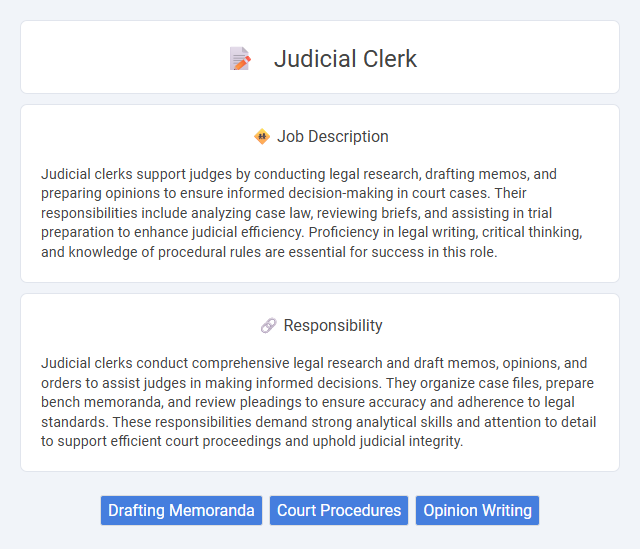
Judicial clerks support judges by conducting legal research, drafting memos, and preparing opinions to ensure informed decision-making in court cases. Their responsibilities include analyzing case law, reviewing briefs, and assisting in trial preparation to enhance judicial efficiency. Proficiency in legal writing, critical thinking, and knowledge of procedural rules are essential for success in this role.
Individuals with strong analytical skills and a keen eye for detail are likely to thrive as judicial clerks, given the intricate nature of legal research and document review involved. Those who possess excellent writing abilities and can maintain confidentiality under pressure may find this role well-suited to their strengths. Conversely, people who prefer more direct client interaction or less structured environments might face challenges adapting to the demands of judicial clerkship.
Qualification
Judicial Clerk positions typically require a Juris Doctor (JD) degree from an accredited law school and excellent academic credentials, often reflected by class rank or law review membership. Candidates must demonstrate strong legal research, writing skills, analytical abilities, and attention to detail to effectively assist judges in case management and opinion drafting. Prior experience as a law clerk, internships with courts, or judicial externships significantly enhance qualifications and competitiveness for these roles.
Responsibility
Judicial clerks conduct comprehensive legal research and draft memos, opinions, and orders to assist judges in making informed decisions. They organize case files, prepare bench memoranda, and review pleadings to ensure accuracy and adherence to legal standards. These responsibilities demand strong analytical skills and attention to detail to support efficient court proceedings and uphold judicial integrity.
Benefit
Judicial clerk positions likely offer significant benefits such as gaining invaluable legal experience and insight into court processes. The role probably enhances critical thinking and research skills, which can improve future career prospects in law. Clerks may also benefit from networking opportunities and prestigious references that support professional advancement.
Challenge
A judicial clerk position likely presents significant intellectual challenge, demanding rigorous legal analysis and precise interpretation of complex statutes and case law. The role probably requires adapting to diverse cases, each with unique facts and legal questions, which can test one's critical thinking and writing skills. High-stakes decision support and meticulous attention to detail may also contribute to the demanding nature of this job.
Career Advancement
Judicial clerk positions provide invaluable experience in legal research, writing, and court procedures, serving as a critical stepping stone for aspiring judges, attorneys, and legal scholars. Clerks often gain direct mentorship from judges, which enhances their understanding of case law and courtroom dynamics, significantly boosting their credentials for future roles in prestigious law firms or judicial appointments. This role accelerates career advancement by building a strong professional network and establishing a reputation for analytical rigor and ethical judgment.
Key Terms
Drafting Memoranda
Judicial clerks play a crucial role in drafting memoranda that analyze case law, statutes, and legal precedents to assist judges in decision-making. These memoranda require meticulous research, clear organization of complex legal issues, and precise articulation of arguments to support judicial opinions. Mastery of legal writing and critical analysis ensures the production of persuasive and well-reasoned judicial memoranda.
Court Procedures
Judicial clerks play a crucial role in supporting judges by researching and analyzing legal issues and court procedures, ensuring accurate application of the law. They draft and review legal documents, summarize case facts, and assist in preparing opinions while maintaining compliance with procedural rules. Expertise in court procedures, including filing motions, managing evidence, and understanding trial processes, is essential for efficient case management and decision-making in the judicial system.
Opinion Writing
Judicial clerks play a critical role in opinion writing by conducting comprehensive legal research and drafting clear, well-reasoned opinions that support judges' decisions. They analyze case law, statutes, and precedents to ensure the accuracy and coherence of judicial rulings. Expertise in legal writing and attention to detail are essential for producing persuasive and authoritative judicial opinions.
 kuljobs.com
kuljobs.com